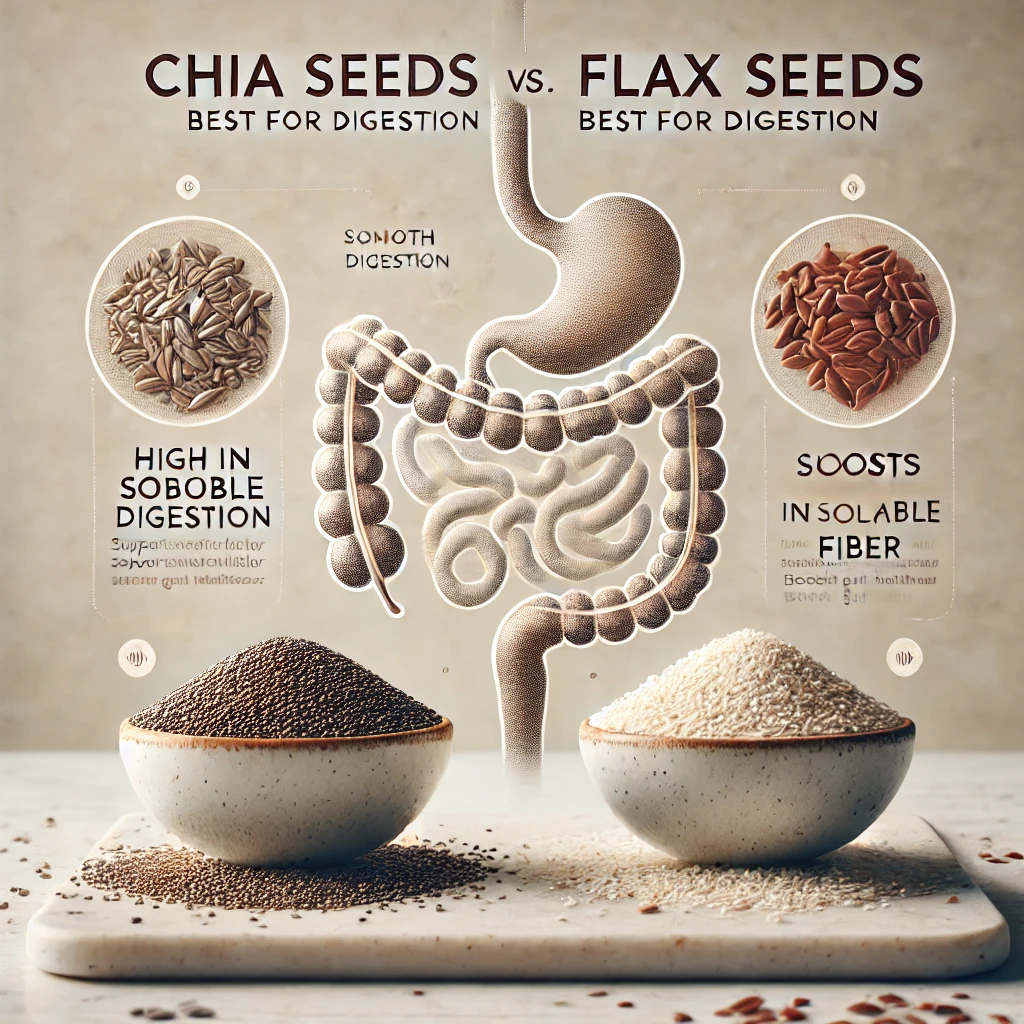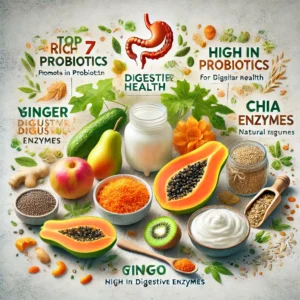Both chia seeds and flax seeds have earned their place as superfoods, packed with nutrients that support digestion and overall gut health. As fiber-rich seeds, they help regulate digestion and offer multiple health benefits. But when it comes to choosing between the two, which one is better for digestive health? In this article, we’ll explore the unique digestive benefits of chia and flax seeds, compare their fiber content, and help you decide which one suits your digestive needs best.
1. Chia Seeds for Digestion: Fiber and Gel Formation
Chia seeds are well known for their impressive fiber content, particularly soluble fiber. When soaked in water or other liquids, chia seeds form a gel-like substance due to their high mucilage content. This gel softens stool, making it easier to pass and promoting regular bowel movements.
- Soluble Fiber Power: Chia seeds contain about 10 grams of fiber per ounce, with most of that being soluble fiber. Soluble fiber attracts water and forms a gel during digestion, which helps to slow down digestion and support a healthy gut. This can be particularly beneficial for those who experience bloating or irregularity.
- Gel Formation: When chia seeds are mixed with liquid, they can absorb up to 10 times their weight in water, forming a gel that helps bulk up stool and smooth the digestive process.
In my experience, adding chia seeds to my smoothies helped significantly with digestion. The gel they form made digestion easier and helped me feel lighter after meals. This, along with their mild flavor, makes chia seeds easy to integrate into various dishes without altering taste.
2. Flax Seeds for Digestive Health: Rich in Fiber and Omega-3
Flax seeds are another nutritional powerhouse, known for their high fiber and Omega-3 fatty acid content. However, flax seeds are a bit different from chia seeds in terms of their fiber composition and how they benefit digestion.
- Rich in Both Soluble and Insoluble Fiber: Flax seeds contain 8 grams of fiber per ounce, with a more balanced mix of soluble and insoluble fiber. Insoluble fiber helps add bulk to stool, making it particularly effective in preventing constipation. The soluble fiber in flax seeds also helps to maintain gut health by feeding beneficial bacteria in the gut microbiome.
- Omega-3 Fatty Acids: One unique advantage of flax seeds is their high content of ALA (alpha-linolenic acid), a plant-based Omega-3 that offers anti-inflammatory properties. While Omega-3s don’t directly affect digestion, they contribute to gut health by reducing inflammation that can occur in the digestive tract.
- Best Consumed Ground: One important factor to note is that whole flax seeds are hard for the body to digest. To get the most benefit, it’s recommended to consume ground flax seeds, as the nutrients and fiber are more easily absorbed this way.
I noticed that when I started consuming ground flax seeds, my digestion felt more regular. However, I found that flax seeds felt slightly heavier than chia, and I preferred to consume them in smaller quantities. Nonetheless, they played a role in improving my gut health.
3. Chia Seeds vs. Flax Seeds: Fiber Comparison
Fiber is a key factor in digestive health, and both chia and flax seeds provide substantial amounts of it. However, the type of fiber they offer varies, and this can impact how they affect your digestion.
- Chia Seeds: High in soluble fiber, chia seeds slow down digestion and can help with conditions like diarrhea or irritable bowel syndrome (IBS) by forming a gel that smooths the digestive process.
- Flax Seeds: Flax seeds offer both soluble and insoluble fiber, making them ideal for those dealing with constipation. Insoluble fiber adds bulk to stool, promoting regularity and preventing digestive discomfort.
For those looking for a gentle solution to digestive issues like bloating or IBS, chia seeds may be the better option. On the other hand, flax seeds can be more effective for those needing relief from constipation or who want a more robust fiber source to maintain gut health.
4. My Experience: How I Combined Chia and Flax Seeds for Better Digestive Health
In my personal journey to improve digestion, I experimented with both chia and flax seeds separately before deciding to combine them. Here’s what I found:
- Chia Seeds: I started with chia seeds, adding them to smoothies and salads. Within a few days, I noticed improved regularity and less bloating. The gel-forming property of chia seeds made digestion smoother and prevented the heaviness I sometimes felt after meals.
- Flax Seeds: After a few weeks, I introduced flax seeds into my diet, consuming them in ground form. While they were effective in promoting regularity, I found that flax seeds had a heavier texture and needed to be consumed in smaller portions. However, I did notice that flax seeds reduced inflammation, which helped with occasional gut discomfort.
Ultimately, I decided to combine both seeds in my daily routine. This allowed me to enjoy the soluble fiber benefits of chia seeds and the insoluble fiber of flax seeds, which created a more balanced digestive experience. Both seeds played a crucial role in improving my gut health.
Conclusion: Which Seed Is Better for Digestive Health?
When it comes to digestive health, both chia seeds and flax seeds offer substantial benefits, but which one is better depends on your specific needs:
- For smoother digestion and bloating relief, chia seeds may be the better option due to their high soluble fiber content and gel-forming properties.
- For preventing constipation and improving regularity, flax seeds offer the advantage of both soluble and insoluble fiber, as well as additional anti-inflammatory benefits from Omega-3s.
Ultimately, the best approach may be to include both chia and flax seeds in your diet to reap the unique benefits each provides for gut health. Whether you choose one or the other, or decide to combine them, your digestive system will thank you!





